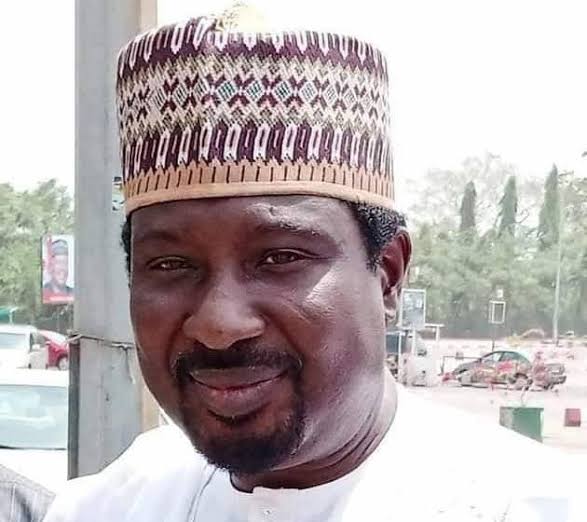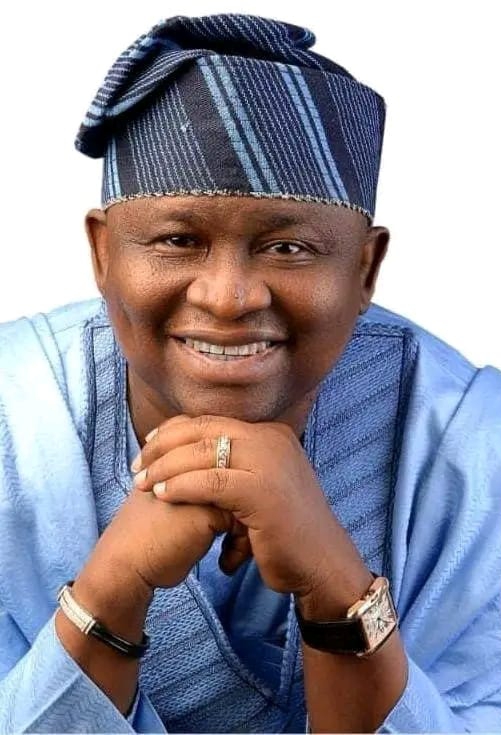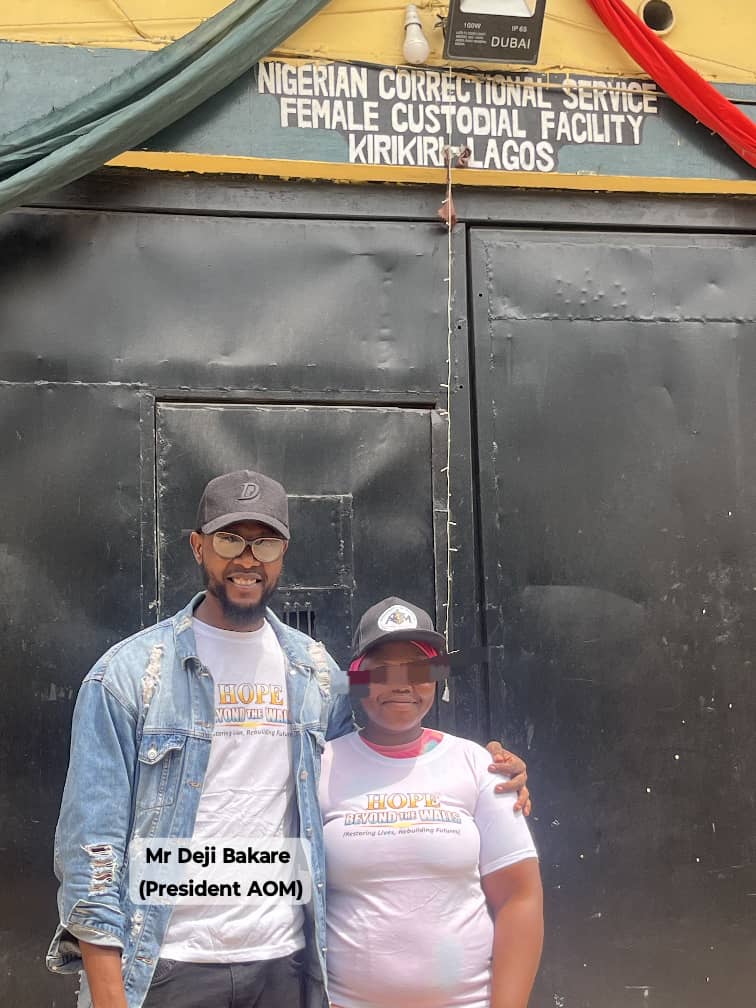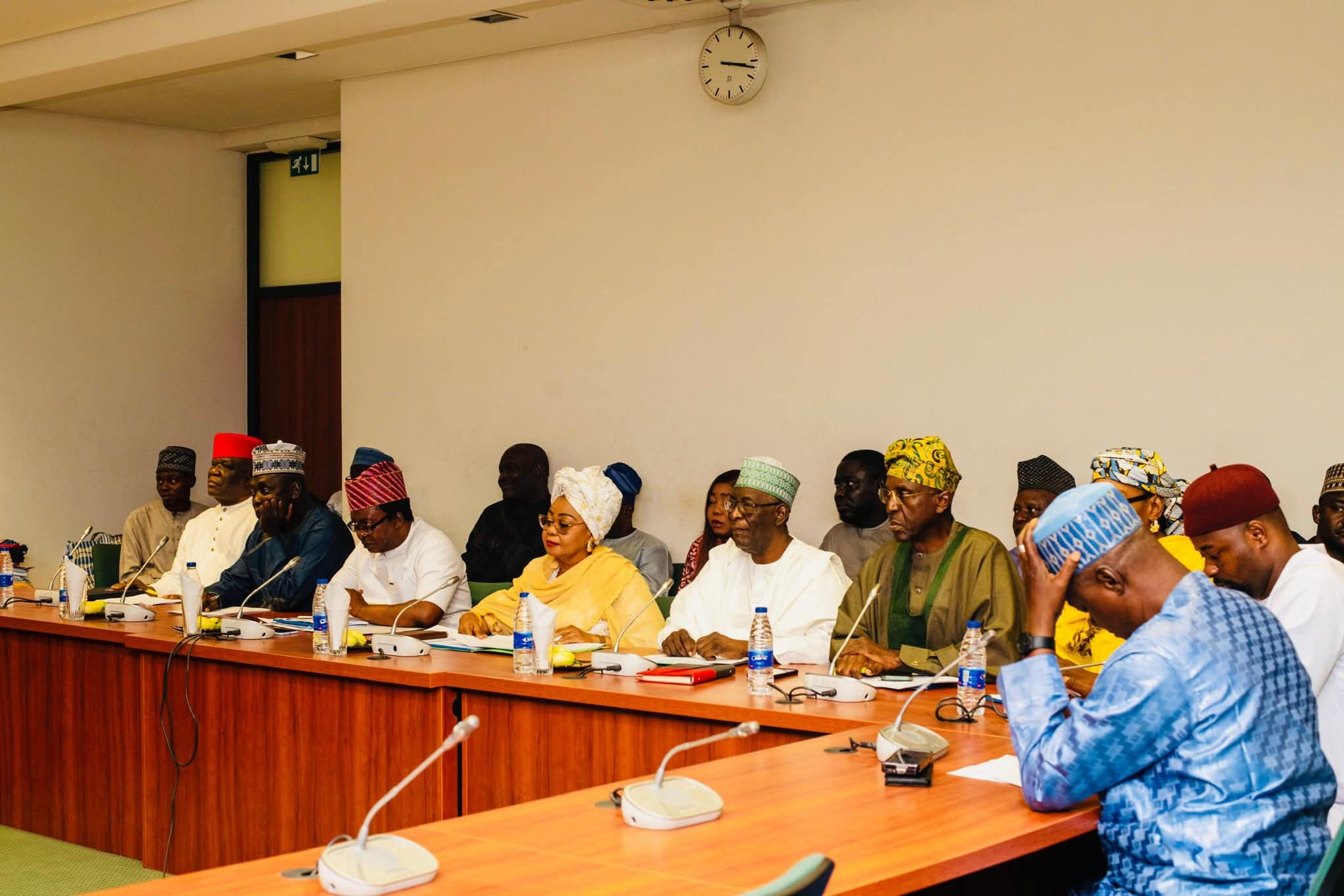society
Senator Jibrin Barau: Why He is North West’s Most Important Political Force

Senator Jibrin Barau:
Why He is North West’s Most Important Political Force by Tayo Williams
_“Senator Jibrin is a steady and stabilising force in the Senate and beyond. He is blessed with the moral authority and rare ability to put an issue on the national agenda that wouldn’t naturally be there. Although he may not be getting the desired coverage or recognition for his legislative, political, and social interventions, the deputy senate president has mastered the art of being relevant in the centre and indispensable at home.”_
The Northwest, Nigeria’s most populous geopolitical zone with over 22 million registered voters, is the coveted ‘bride’ for all presidential aspirants. According to the Independent National Electoral Commission, INEC, three states in the region – Kano, Kaduna, and Katsina – rank among the top 10 in the list of states with the highest number of registered voters. Kano State, number two on the list behind Lagos, has 5,921,370 registered voters. Kaduna and Katsina have 4,335,208 and 3,516,719 registered voters respectively. The closest to it is the southwest with about 18million registered voters.
The gulf is, indeed, wide and almost unassailable.
During the last presidential election, the northwest gave President Bola Ahmed Tinubu 2.7 million votes – the highest by any region. Even in the southwest, Tinubu’s traditional political base, he could only poll 2,279,407 votes. From the five southeast states, he got a measly 127,605 votes and did not score 25 percent in any of them. The South-South’s 799,957 votes contributed nine percent to the APC’s total votes.
Though it is still early in the day, sustaining influence and popularity in the northwest will be critical to the survival of the APC in the next electoral cycle. Former President Muhammadu Buhari, a Katsina native, is the singular most formidable political figure from the region. However, his legendary aloofness to party politics is a deal-breaker. And after serving out his two-term presidency, he has been ‘far from the madding crowd’ of party nay Nigerian politics. Though he still has a cult following in the north, his reluctance to participate in any electioneering will not help the party.
Conversely, Nasir El-Rufai, the immediate past governor of Kaduna State, would have been the natural successor to Buhari’s political leadership in the region. However, the fractious El-Rufai has left the All Progressives Congress, APC, for the Social Democratic Party. Kano State, with the highest number of registered votes behind Lagos, is a major battleground considering the popularity of the Rabiu Kwankwaso-led NNPP, which inflicted considerable damage on the APC in the last elections.
This is where Senator Barau Jibrin, deputy senate president, comes in.
Senator Jibrin is the highest-ranking APC Senator in the North-West region. An understated force of nature with admirable charisma and eloquence, Barau has been in the National Assembly since the dawn of the Fourth Republic starting as a member of the House of Representatives representing the good people of Tarauni Federal Constituency of Kano State from 1999 to 2003.
A thoroughbred, successful accountant, he chaired the Appropriations Committee and served as a member of others. After his first legislative odyssey, Jibrin returned to his private practice, but not for long, as he was tapped to serve as chairman of the Kano State Investment and Properties Ltd and, later, Commissioner of Science and Technology. He is a foundation member of the APC on which platform he contested and won the Kano North Senatorial District seat in 2015. This is his third term as a senator, and he was the only APC senator in 2023 from Kano, as the other two seats were won by the NNPP, a testament to his formidable political acumen and grassroots appeal. But for political expediency, he would have been the Senate president.
Having won the Kano North senatorial seat three consecutive times, there is no controverting that Jibrin has excelled as a legislator and, therefore, comes well-acquitted to help the APC reclaim Kano, and provide the leadership crucial for the success of the party in the region. Indeed, the president needs not to look far for who to lead the charge in the northwest; that is a role that has naturally fallen on the lap of Senator Jibrin.
Cerebral and controversy-free, Senator Jibrin is a steady and stabilising force in the Senate and beyond. He is blessed with the moral authority and rare ability to put an issue on the national agenda that wouldn’t naturally be there. Although he may not be getting the desired coverage or recognition for his legislative, political, and social interventions, the deputy senate president has mastered the art of being relevant in the centre and indispensable at home.
Assertive, but never abrasive, Jibrin is a man whose thinking has often proved to be ahead of the curve. He was the brain behind the North West Development Commission to address gaps in infrastructural development in the region, which has now been replicated in other regions. He also supported and sponsored a bill to build the Federal University of Education Technology in Bichi, Kano State, and the Federal Polytechnic Kabo, where his father was born.
While other politicians are engaged in a never-ending race to amass riches to guarantee eternally their obscene residence in their snug life of luxury and privilege, Senator Jibrin strives to spread joy daily among kith and kin, and the next needy family on the block. Evidence of his amazing compassion and superior culture of philanthropy abound everywhere in the region whether in education, agriculture, health, and youth empowerment. He is there when the people need him.
The ranking senator recognises the role that fate has inadvertently thrust upon him and he has been playing the part pretty well by reaching out to opposition politicians and convincing them that the APC needs them. Recently, he hosted a strategic meeting with the former Secretary to the Kano State Government, Dr. Abdullahi Baffa Bichi, and other NNPP stalwarts, including the former Commissioner for Project Monitoring and Evaluation, Muhammad Diggol, in his Abuja residence.
Jibrin said, “We had fruitful discussions with them on the development of our dear state and the country. The development of our state and the country is always at the top of our agenda. We will continue to collaborate with other stakeholders to advance our state and the nation. Let’s do it together to better the lots of our people.” For him, it is about Kano and Nigeria, not any self-serving purpose.
Indeed, there is no clear-cut path to greatness in politics. It requires a special kind of talent that is rare in today’s politicians, but which Senator Jibrin embodies in large quantity. For the APC to make any headway in the northwest in the next general election, it would need, most importantly, Senator Jibrin, leading the charge.
_*-Williams is a Lagos-based media executive*_
society
HOPE BEYOND THE WALLS 2026: ASSOCIATION OF MODELS SUCCESSFULLY SECURES RELEASE OF AN INMATE, CALLS FOR CONTINUED SUPPORT

HOPE BEYOND THE WALLS 2026: ASSOCIATION OF MODELS SUCCESSFULLY SECURES RELEASE OF AN INMATE, CALLS FOR CONTINUED SUPPORT
The Association of Models (AOMNGO) proudly announces the successful completion of the first edition of Hope Beyond the Walls 2026, a humanitarian initiative dedicated to restoring hope and freedom to deserving inmates.
Despite enormous challenges, financial pressure, emotional strain, and operational stress, the organization remained committed to its mission. Through perseverance, faith, and collective support, one inmate has successfully regained freedom a powerful reminder that hope is stronger than circumstance.
This milestone did not come easily.
Behind the scenes were weeks of coordination, advocacy, fundraising, documentation, and intense engagement. There were moments of uncertainty, but the determination to give someone a second chance kept the vision alive.
Today, the Association of Models gives heartfelt appreciation to all partners and sponsors, both locally and internationally, who stood with us mentally, financially, morally, and physically.
Special Recognition and Appreciation To:
Correctional Service Zonal Headquarters Zone A Ikoyi
Esan Dele
Ololade Bakare
Ify
Kweme
Taiwo & Kehinde Solagbade
Segun
Mr David Olayiwola
Mr David Alabi
PPF Zion International
OlasGlam International
Razor
Mr Obinna
Mr Dele Bakare (VOB International)
Tawio Bakare
Kehinde Bakare
Hannah Bakare
Mrs Doyin Adeyemi
Shade Daniel
Mr Seyi United States
Toxan Global Enterprises Prison
Adeleke Otejo
Favour
Yetty Mama
Loko Tobi Jeannette
MOSES OLUWATOSIN OKIKIADE
Moses Okikiade
(Provenience Enterprise)
We also acknowledge the numerous businesses and private supporters whose names may not be individually mentioned but whose contributions were instrumental in achieving this success.
Your generosity made freedom possible.
A CALL TO ACTION
Hope Beyond the Walls is not a one-time event. It is a movement.
There are still many deserving inmates waiting for a second chance individuals who simply need financial assistance, legal support, and advocacy to reunite with their families and rebuild their lives.
The Association of Models is therefore calling on:
Corporate organizations
Local and international sponsors
Philanthropists
Faith-based organizations
Community leaders
Individuals with a heart for impact
to partner with us.
Our vision is clear:
To secure the release of inmates regularly monthly, quarterly, or during special intervention periods through structured support and transparent collaboration.
HOW TO SUPPORT
Interested partners and supporters can reach out via
Social Media: Official Handles Hope In Motion
Donations and sponsorship inquiries are welcome.
Together, we can turn difficult stories into testimonies of restoration.
ABOUT AOMNGO
The Association of Models (AOMNGO) is a humanitarian driven organization committed to advocacy, empowerment, and social impact. Through projects like Hope Beyond the Walls, the organization works tirelessly to restore dignity and create opportunities for individuals seeking a second chance.
“When we come together, walls fall and hope rises.”
For media interviews, partnerships, and sponsorship discussions, please contact the Association of Models directly.
society
SENATOR ADEOLA YAYI REGISTERS 4000 JAMB CANDIDATES

SENATOR ADEOLA YAYI REGISTERS 4000 JAMB CANDIDATES
In continuation of his educational support initiatives and following established tradition, Senator Solomon Adeola (APC,Ogun West) has successfully paid for and enrolled 4000 indigent students for the 2026 Joint Admission Matriculation Board(JAMB) examination.
According to a release e-signed and made available to members of the League of Yewa-Awori Media Practitioners (LOYAMP) by High Chief Kayode Odunaro, Media Adviser to Senator Adeola and shared with (your mediu), the programme financed by the senator under the “SEN YAYI FREE JAMB 2026” ended on Saturday , February 21, 2026, with a total of 4000 candidates successfully enrolled with their PINs provided.
Commenting on the success of the programme, Senator Adeola said the programme is another leg of his personal educational empowerment for indigent but brilliant citizens preparatory to his scholarship and bursary facilitation for tertiary education institutions’ students.
“As far as I can help it, none of our children will miss educational opportunities arising out of adverse economic predicament of their parents or guardians”, he stated.
Successful candidates cut across all the three senatorial districts of Ogun State with 2183 coming from Ogun West, 1358 coming from Ogun Central and 418 from Ogun East.
Some of the candidates that applied and are yet to get their PINs due wrong information supplied in their profiles and being underage as discovered by JAMB and other reasons are being further assisted to see the possibility of getting their PINs.
The Free JAMB programme of the Senator that has been running for years is well received by appreciative beneficiaries and their parents.
Alhaji Suara Adeyemi from Ipokia Local Government whose daughter successfully got her PIN in the programme said the Senator’s gesture was a welcome financial relief for his family at this period after payment of numerous school fees of other siblings of the beneficiary seeking admission to higher institution.
Also posting on the social media handle of the Senator, a beneficiary Mr. Henry Olaitan, from Odeda LGA said that he would have missed doing the entry examination as his guardian cannot afford the fees for himself and two of his children.
society
House Committee Seeks Stronger Financial Backing for Federal Character Commission

House Committee Seeks Stronger Financial Backing for Federal Character Commission
The Executive Chairman of the Federal Character Commission (FCC), Honorable Hulayat Motunrayo Omidiran, has reassured the commitment of her new leadership to reposition the Commission and strengthen enforcement of the federal character principle, despite prevailing funding challenges.
Hon. Omidiran made this known during the Commission’s budget defence before the House of Representatives Committee on Federal Character at the National Assembly on Friday, February 19, 2026.
The Executive Chairman opened up on inadequate funding has continued to constrain the Commission’s statutory activities, including nationwide monitoring, compliance audits and enforcement measures across Ministries, Departments and Agencies (MDAs).
“We are focused and determined to do the work that the Constitution and the President have entrusted us with,” Omidiran stated.
The FCC Boss, however, assured lawmakers that the Commission remains resolute in ensuring equity, fairness and balanced representation in line with its constitutional mandate.
“As a Commission, it is our responsibility to engage with relevant government parastatals and ministries to secure the necessary funding we require. We believe that with consultation and collaboration, it will be a successful venture for the Commission.”
Earlier, the Chairman of the House Committee on Federal Character, RT. Hon. Ahmed Idris Wase, expressed deep concern over what he described as near-zero budgetary allocation to the Commission, stressing that such financial inadequacies severely undermine its operational effectiveness.
The Plateau State lawmaker assured the Commission of the Committee’s firm legislative backing in advocating for improved funding and strengthening the Commission’s capacity to fully exercise its constitutional mandate.
“We cannot reasonably expect the Federal Character Commission to enforce compliance across Ministries, Departments, and Agencies while grappling with insufficient funding,” Hon. Wase remarked.
“If we are genuinely committed to fairness, equity, and national cohesion, then we must be deliberate in adequately funding the institution established to safeguard these principles.
“As a Committee, we shall work closely with the leadership of the Commission to ensure that its budgetary provisions reflect the magnitude of its mandate. The era of skeletal or token funding must give way to realistic and sustainable financial support,” he concluded.
The budget defence session concluded on a note of renewed collaboration between the House of Representatives and the Commission, reflecting a shared determination to strengthen institutional capacity, enhance accountability, and promote equitable representation within Nigeria’s public service.
SIGNED:
Ademola Lawrence
Spokesperson,
Federal Character Commission
February 20, 2026
-

 celebrity radar - gossips6 months ago
celebrity radar - gossips6 months agoWhy Babangida’s Hilltop Home Became Nigeria’s Political “Mecca”
-

 society6 months ago
society6 months agoPower is a Loan, Not a Possession: The Sacred Duty of Planting People
-

 society5 months ago
society5 months agoReligion: Africa’s Oldest Weapon of Enslavement and the Forgotten Truth
-

 news6 months ago
news6 months agoTHE APPOINTMENT OF WASIU AYINDE BY THE FEDERAL GOVERNMENT AS AN AMBASSADOR SOUNDS EMBARRASSING













